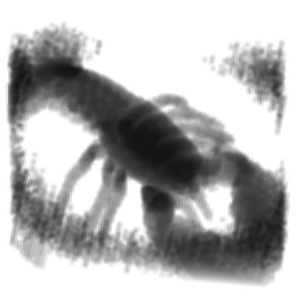Information
- Publication Type: Journal Paper with Conference Talk
- Workgroup(s)/Project(s):
- Date: September 2004
- Journal: Computer Graphics Forum
- Volume: 23
- Number: 3
- ISSN: 0167-7055
- Pages: 668 – 661
- Keywords: Graphics Data Structures and Data Types
Abstract
We present Volume dots (Vots), a new primitive for volumetric data modelling, processing, and rendering. Vots are a point-based representation of volumetric data. An individual Vot is specified by the coefficients of a Taylor series expansion, i.e. the function value and higher order derivatives at a specific point. A Vot does not only represent a single sample point, it represents the underlying function within a region. With the Vots representation we have a more intuitive and high-level description of the volume data. This allows direct analytical examination and manipulation of volumetric datasets. Vots enable the representation of the underlying scalar function with specified precision. User-centric importance sampling is also possible, i.e., unimportant volume parts are still present but represented with just very few Vots. As proof of concept, we show Maximum Intensity Projection based on Vots.Additional Files and Images
Weblinks
No further information available.BibTeX
@article{grimm-2004-volume,
title = "VOTS: VOlume doTS as a Point-Based Representation of
Volumetric Data",
author = "S\"{o}ren Grimm and Stefan Bruckner and Armin Kanitsar and
Eduard Gr\"{o}ller",
year = "2004",
abstract = "We present Volume dots (Vots), a new primitive for
volumetric data modelling, processing, and rendering. Vots
are a point-based representation of volumetric data. An
individual Vot is specified by the coefficients of a Taylor
series expansion, i.e. the function value and higher order
derivatives at a specific point. A Vot does not only
represent a single sample point, it represents the
underlying function within a region. With the Vots
representation we have a more intuitive and high-level
description of the volume data. This allows direct
analytical examination and manipulation of volumetric
datasets. Vots enable the representation of the underlying
scalar function with specified precision. User-centric
importance sampling is also possible, i.e., unimportant
volume parts are still present but represented with just
very few Vots. As proof of concept, we show Maximum
Intensity Projection based on Vots.",
month = sep,
journal = "Computer Graphics Forum",
volume = "23",
number = "3",
issn = "0167-7055",
pages = "668--661",
keywords = "Graphics Data Structures and Data Types",
URL = "https://www.cg.tuwien.ac.at/research/publications/2004/grimm-2004-volume/",
}


 Paper
Paper
